Ever since I reviewed Squid Inc (don’t listen to Tom Vasel) and Fantasy Realms, I have to admit that Wizkids is grabbing my attention as of late. Atlantic Robot League is a title that I kept my eye on for the past few months due to its simple concept. There is an arena full of robots beating the paint off each other’s metal frame, and you’re betting on them.
It’s not an original theme by any stretch. Games old and new have players stick on the audience side of sports, such as Camel Up, Cheaty Mages, and Fired Up. However, none of them have violent giant robots, and as a child of the 80s, I am conditioned to like this.
The goal is as simple as its premise: Get the most points over three rounds. Your tools for the job are a dry-erase marker, some credits, and a foldable pad to write your bets.
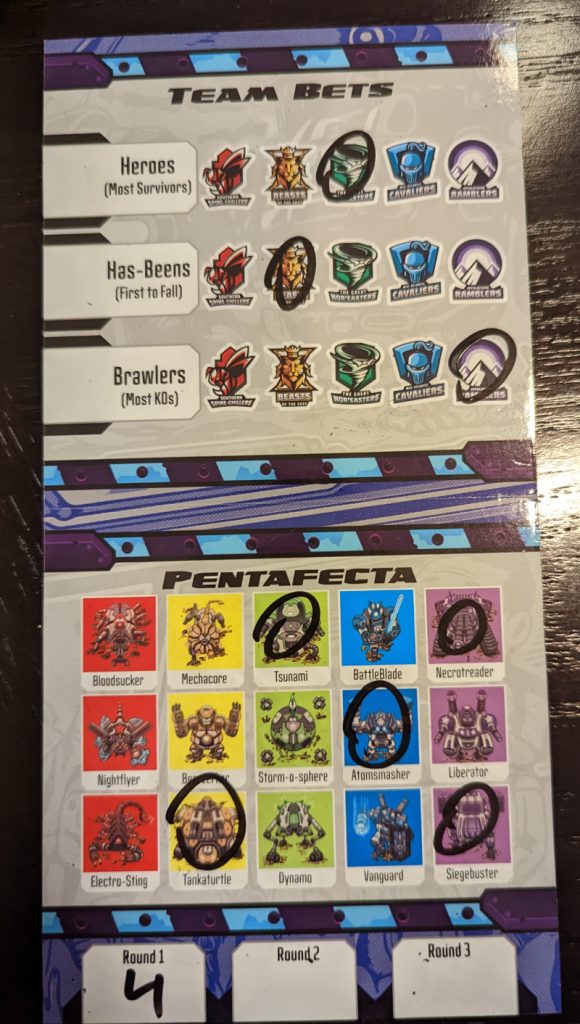
Time to make regrettable decisions
The arena itself is a grid full of robots from five separate teams mixed with one open area. The robots in the corner spaces will have a credit token, rewarding the player who knocks them out.
After the arena setup, the round starts with the betting. In your pad, you have your team bets and the pentafecta. For the team bets, you will pick a team in three separate categories: The most survivors, the first to be eliminated, and the most knockouts.
The challenge comes in the pentafecta bets. You have to guess which five robots will remain at the end of the round.
You also have ninety seconds to figure this out, and everyone is doing it simultaneously. No pressure.
Once the bets are done, the first player will take their turn, and it goes clockwise.
The first action you can do on your turn is playing a Scheme. By spending one credit, you can use one of the two face-up scheme cards immediately. By following the instructions on these scheme cards, you bend the rules. We’ve all seen this before, as it is present in almost every card game.
Whether or not you decide to use a Scheme card, you have to move a mech. Pick a mech, and slide that bugger one space orthogonally. If they are next to a rival, they must knock them down but can only KO one mech per turn. Each team has two fixed rivals, such as the Beasts of the Easts having a wrench to pick with The Atlantic Calvarlies and the Southern Spine Chillers.
Now if this sounds like the world’s most violent sliding puzzle, yes, yes it is. Use a scheme card, move a piece, and knock out a mech. That’s the entire turn.
There is one extra rule, and that’s the Fixer. Before any team is eliminated, you can announce that you are using a Fixer. For each credit you spend, you can change one mech in your Pentafecta.
Turns will repeat until only five or fewer mechs are remaining. Afterward, everyone shows their bets and score accordingly.
Did I mention this is a twenty-minute game? Because it’s a twenty-minute game.
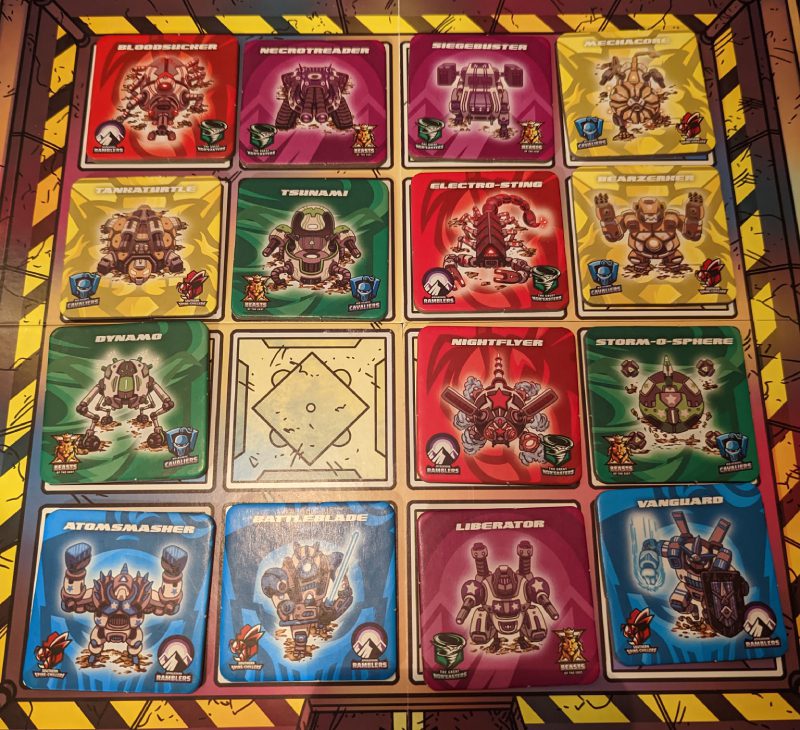
Quicker than ordering a meal
That’s a critical trait to mention. The market for twenty-minute board games is ridiculously fierce. Just looking at games that start with the letter F, you have classics like For Sale or Fairy Tale, and ones that are making their mark like Wizkids’ own Fantasy Realms.
Atlantic Robot League is like the local coffee shop across the hotel you are staying for vacation. It’s not bad, but you will forget about it.
It’s frustrating to type that out because, unlike many games I don’t have the most positive feelings about, Atlantic Robot League’s design is more thoughtful than most.
One area that strikes me immediately is the scoring. Obviously, if you are correct on your bets, you score points. In Team Bets, the payout is not consistent. If you are the only one who picked that team, congrats, you get five points. If three people choose the same team as you, you only score one point.
This is a great system because it’s fair and scales with any number of players. Plus, if you manage to be the only one who picked a winning team in a five-player game, you feel you got away with murder due to a technicality.
It goes beyond the betting. Using a sliding puzzle system to simulate this metal bathtub of robot death works quite well. Not only is this understandable by almost anybody, but it also cleaves the pacing around the table. Barely any downtime here unless you have a player that is taking this way too seriously.
Almost as rigged as a boxing match
As silly as this sounds, there is a bit of economics here too. Since each team has fixed rivals, this does mean as robots are being KOed left and right, some teams will have a distinct advantage over others as the arena opens up. If you placed a bet on the red team, you need to make sure that both blue and yellow don’t become a problem.
The scheme cards also open up some opportunities for nasty players. All of them modify moving and attacking in a certain way. You can have a scheme card that attacks all rivals surrounding your chosen mech or have the mech keep moving in one direction until it hits a wall or another mech. Combine this with the Fixer rule, and you can conjure some malicious plays.
One particular game involved a flamethrower scheme card, an attack that would strike two spaces in a straight line. I saw an opportunity to eliminate a team in one move, so I used the Fixer to change my pentafecta bets, activated the scheme card, and laughed hard. After all, since a team was eliminated, no one else can change their pentafecta bets.
For a game where I said I had mixed feelings, I’m certainly giving it a lot of praise. As I wrote before, this is a thoughtful design, but it’s also a limited one.
Everything I have described so far happens in every game with little variance.
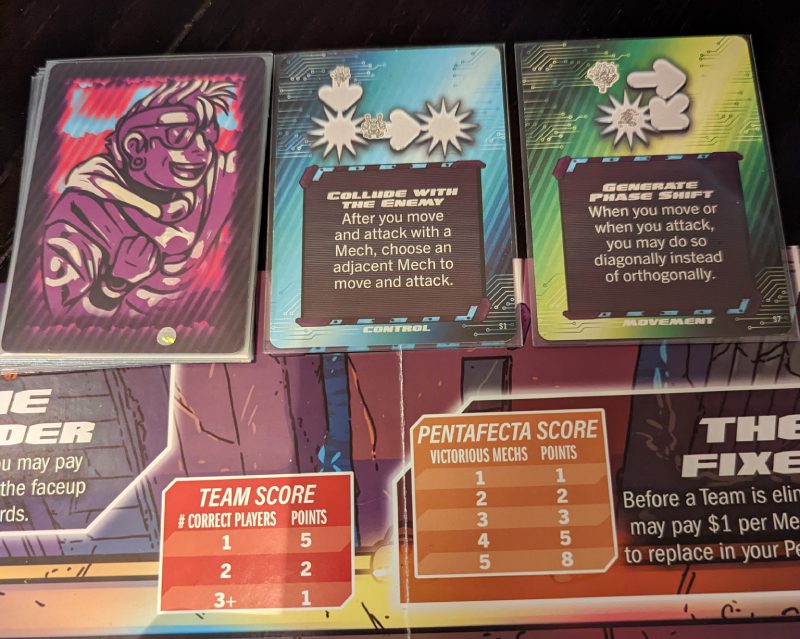
The repetition kicks in fast
Each round starts the same, with everyone examining the arena and the robot places as if it were a company potluck, and this is their first go-around. You will spot the potential opportunities and think of plan Bs or plans Cs. Behind your little foldable betting mat with the ninety seconds looming over your head.
When the bell rings and the clash of the metal begins, you will slide mechs around the arena to smash your way to victory. You will pay for scheme cards for the right moments, and if you run out of credits, you aim for the corner mechs to get those credits back. The round will eventually end, and you will repeat this process for two more rounds.
Whether it is pushing your luck in Fantasy Realms or putting on your acting skills in Blood on the Clocktower, great board games want you to express yourself through their mechanisms and systems.
I’ve played Atlantic Robot League five times for this review, and while it was amusing by the end of my first game, the next four games felt the same. There was no sense of growth or progression in my understanding of it. Whether I played with three people or five, I felt I was going through the motions with none of my opponent’s personalities piercing through this game’s curtains. Like betting on horses, I can only watch the events unfold before me alongside a series of cheers and boos.
It’s not a convoluted experience
But there is a silver lining here. While this is a limiting game, it’s an understandable one. In my fifth and final game, one player in that session was a non-gamer. She felt that a game like Catan was too complex for her.
Yet when she played this game, she didn’t have trouble understanding what was going on and came in second place. There weren’t any weird rules to memorize or anything that felt out of place for her. If there is something to say about Atlantic Robot League, it is a highly intuitive game that anyone can get into quickly.
Twenty-minute games are a challenging market. With the alternatives being as good as there are, it’s hard to put Atlantic Robot League on a pedestal unless the crowd you’re catering to is new to board games or are young children. Sadly, I wish I had more positive impressions since I love the concept and the name. Atlantic Robot League. Just saying those words is like a tongue massage.


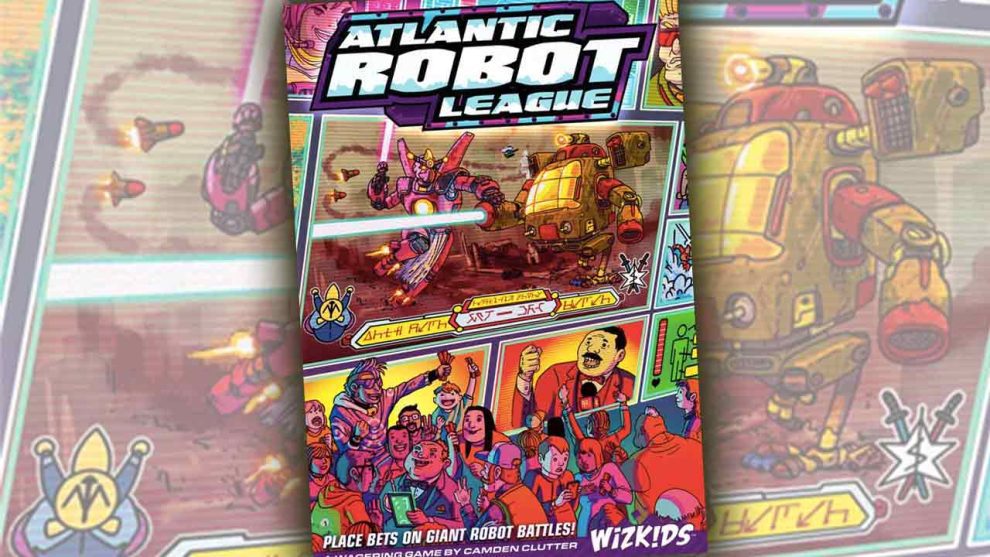




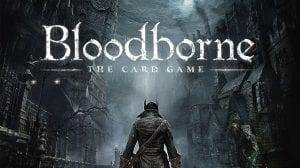




Add Comment